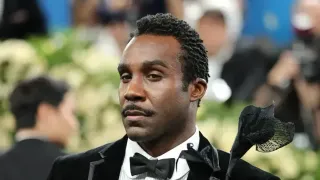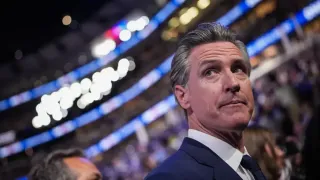April 3, 2019
Health Care Repeal Off the To-Do List for GOP Lawmakers
Lisa Mascaro and Catherine Lucey READ TIME: 4 MIN.
"Not any longer."
And with that, a triumphant Senate Majority Leader Mitch McConnell appeared to close the book Tuesday on a divisive Republican debate, convincing President Donald Trump to shelve plans to replace the Affordable Care Act until after the 2020 election.
"I made it clear to him that we were not going to be doing that in the Senate," McConnell told reporters.
It was a rare public disclosure of private counsel from the Republican leader. And it signaled that, after two years in Trump's Washington, Republicans on Capitol Hill are figuring out how to handle the president and his impulsive swerves on policy.
Trump insisted Tuesday it was his idea to switch course.
"I wanted to delay it myself," Trump said during an event at the White House. "I want to put it after the election."
Facing a court deadline, Trump seized on health care last week, backing a lawsuit seeking to strike down the Affordable Care Act. Trump's motivations were as political as they were legislative. He didn't want to cede the issue again in the 2020 campaign, according to a person familiar with the conversations who was not authorized to speak publicly.
"We're going to keep the presidency, and we'll vote in the best health care package we've ever had," he said.
The Trump and McConnell had not spoken for days. The president stunned Republicans last week by announcing he wanted to try again to repeal and replace the Affordable Care Act, insisting the GOP could become the "party of health care." Republicans wanted no part of a do-over after their failure to replace the law in 2017. Facing a revolt from the ranks, McConnell told the president he needed him to listen, according to a person who was granted anonymity to discuss the private call.
McConnell explained to Trump that senators are open to tackling specific aspects of health care – namely, trying to lower prescription drug prices. But Trump's promised big, new health care bill wasn't going happen with Democrats running the House. Instead, Trump could focus on the issue during the election.
Several times McConnell told Trump to listen, the person said. And it worked. Trump told McConnell he "accepted" the situation and "would be developing a plan that he would take to the American people during the 2020 campaign." That night, Trump tweeted as much.
"So we don't have a misunderstanding about that," McConnell said Tuesday.
Trump's shift – he tweeted late Monday that Congress will vote on a GOP plan after the elections "when Republicans hold the Senate & win back the House" – made clear that the health care debate will be left for voters to decide during the race for the White House.
That arrangement suits Democrats just fine. They are denouncing Trump's attempt to overturn the ACA in court and floating various health care plans, including an expansion of government-funded Medicare with so called "Medicare for All," setting up a stark contrast between the parties for the campaign trail.
Senate Minority Leader Chuck Schumer said Trump will "hold Americans hostage through 2020" on an issue that affects millions of people. He said that Trump "insists he has a magic plan that we can see if only the American people re-elect him."
House Speaker Nancy Pelosi of California said Democrats' health care battle with Trump is "a values fight."
After Trump dropped the issue on Republicans last week, many hoped it would just go away. They had no comprehensive proposal to replace the ACA law and no big plans to unveil one. Publicly and privately, Republicans tried to talk to Trump.
McConnell has made it clear Republicans should spend their time attacking "Medicare for All" proposals rather than revisiting the ACA debate, according to a Republican granted anonymity to discuss the private thinking.
Rep. Mark Meadows, R-N.C., a Trump confidant, called shifting the debate to 2021 "a very pragmatic decision." He said Tuesday that "spending quality time to develop a comprehensive strategy" would be "critical."
Trump's effort to repeal former President Barack Obama's 2010 health care law narrowly failed in the Senate in 2017 when Republicans controlled both chambers in Congress. He still blames the late Sen. John McCain for joining other senators to oppose a last-ditch plan.
While Republicans gained Senate seats last fall, GOP senators – particularly those up for re-election next year – weren't looking for another fight over the law. They saw how the issue played in 2018, when Democrats made it the cornerstone of their successful drive to win back the House.
Preserving health care protections, and especially for people with pre-existing conditions, resonates with voters. According to AP VoteCast, a survey of more than 115,000 midterm voters nationwide, nearly 4 in 10 Democratic voters identified health care at the top of a list of key issues.
As Democrats have blamed Republicans for trying to end the ACA, GOP-backed challenges to the 2010 law are making their way through courts.
Last week, the Trump administration told a federal appeals court it wants the entire Affordable Care Act struck down, an outcome that could leave millions of people uninsured.
In his late-Monday tweets, Trump claimed Republicans are developing a plan with cheaper premiums and deductibles that "will be truly great HealthCare that will work for America."
Republicans appeared relieved that, for now, that battle will be fought during the campaign, rather than in Congress.
The No. 2 Senate Republican, John Thune of South Dakota, said the president "has some big ideas and, to his credit, wants to solve problems." But Thune said, "you run into that wall of reality," of a divided Congress with Democrats in control of the House, which requires bipartisanship.
"Trying to convey what the obstacles are to getting what he wants to get done in the next two years is something I think a number of our members conveyed to him," Thune said.
___
Associated Press writers Laurie Kellman, Alan Fram, Ricardo Alonso-Zaldivar, Darlene Superville and Kevin Freking contributed to this report.






